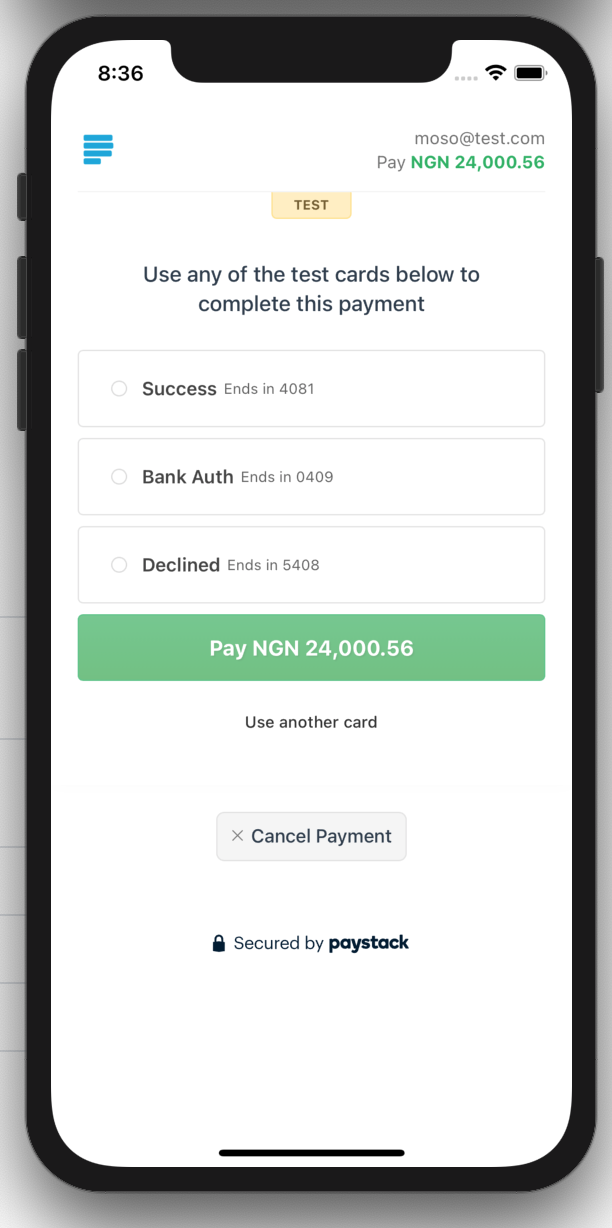Modern, hook-based, Paystack-powered payments in React Native apps using WebViews — now streamlined with Provider architecture & fully customizable.
Endorsed by Paystack, so you know you’re in good hands. Payment processing has never been this easy!

npm install react-native-paystack-webview
# or
yarn add react-native-paystack-webviewyarn add react-native-webview
# iOS
cd ios && pod install
# Expo
npx expo install react-native-webviewimport { PaystackProvider } from 'react-native-paystack-webview';
<PaystackProvider publicKey="pk_test_XXXXXX">
<App />
</PaystackProvider>import React from 'react';
import { Button } from 'react-native';
import { usePaystack } from 'react-native-paystack-webview';
const Checkout = () => {
const { popup } = usePaystack();
const payNow = () => {
popup.checkout({
email: 'jane.doe@example.com',
amount: 5000,
reference: 'TXN_123456',
plan: 'PLN_example123',
invoice_limit: 3,
subaccount: 'SUB_abc123',
split_code: 'SPL_def456',
split: {
type: 'percentage',
bearer_type: 'account',
subaccounts: [
{ subaccount: 'ACCT_abc', share: 60 },
{ subaccount: 'ACCT_xyz', share: 40 }
]
},
metadata: {
custom_fields: [
{
display_name: 'Order ID',
variable_name: 'order_id',
value: 'OID1234'
}
]
},
onSuccess: (res) => console.log('Success:', res),
onCancel: () => console.log('User cancelled'),
onLoad: (res) => console.log('WebView Loaded:', res),
onError: (err) => console.log('WebView Error:', err)
});
};
return <Button title="Pay Now" onPress={payNow} />;
};- ✅ Simple
checkout()ornewTransaction()calls - ✅ Global callbacks with
onGlobalSuccessoronGlobalCancel - ✅ Debug logging with
debugprop - ✅ Fully typed params for transactions
- ✅ Works seamlessly with Expo & bare React Native
- ✅ Full test coverage
| Prop | Type | Default | Description |
|---|---|---|---|
publicKey |
string |
— | Your Paystack public key |
currency |
string |
NGN |
NGN / GHS / USD |
defaultChannels |
string[] |
['card'] |
Payment channels |
debug |
boolean |
false |
Show debug logs |
onGlobalSuccess |
func |
— | Called on all successful transactions |
onGlobalCancel |
func |
— | Called on all cancelled transactions |
| Param | Type | Required | Description |
|---|---|---|---|
email |
string |
✅ | Customer email |
amount |
number |
✅ | Amount in Naira (not kobo) |
reference |
string |
— | Custom reference (optional) |
metadata |
object |
— | Custom fields / additional info |
plan |
string |
— | Paystack plan code (for subscriptions) |
invoice_limit |
number |
— | Max charges during subscription |
subaccount |
string |
— | Subaccount code for split payment |
split_code |
string |
— | Multi-split identifier |
split |
object |
— | Dynamic split object |
onSuccess |
(res) => void |
✅ | Called on successful payment |
onCancel |
() => void |
✅ | Called on cancellation |
onLoad |
(res) => void |
— | Triggered when transaction view loads |
onError |
(err) => void |
— | Triggered on WebView or script error |
| Name | Description | Required? | Default Value |
|---|---|---|---|
cart_id |
A unique identifier for the cart. Can be either a string or a number. | NO |
undefined |
custom_fields |
An array of custom fields for adding additional metadata to the transaction. If not passed, a default custom field is created using the firstName, lastName, and billingName. |
NO |
[{ display_name: '${firstName + ' ' + lastName}', variable_name: '${billingName}', value: '' }] |
cancel_action |
A string specifying the action to take if a transaction is canceled. | NO |
undefined |
custom_filters |
Custom filters to restrict or specify transaction options, such as: | NO |
undefined |
- recurring: A boolean to indicate if the transaction is recurring. |
|||
- banks: An array of bank codes for supported banks. |
|||
- card_brands: Supported card brands, e.g., 'verve', 'visa', 'mastercard'. |
|||
- supported_mobile_money_providers: Supported mobile money providers, e.g., 'mtn', 'atl', 'vod'. |
| Name | use/description | required? |
|---|---|---|
type |
Dynamic Multi-Split type. Value can be flat or percentage |
YES |
bearer_type |
Defines who bears the charges. Value can be all, all-proportional, account or subaccount |
YES |
subaccounts |
An array of subaccount object as defined below. e.g. {"subaccount": 'ACCT_xxxxxx', "share": 60} | YES |
bearer_subaccount |
Subaccount code of the bearerof the transaction. It should be specified if bearer_type is subaccount |
NO |
reference |
Unique reference of the split. Can be defined by the user | NO |
| Name | use/description | required? |
|---|---|---|
subaccount |
Specify subaccount code generated from the Paystack Dashboard or API to enable Split Payment on the transaction. Here's an example of usage: subaccount: "SUB_ACCOUNTCODE" |
YES |
share |
Defines the amount in percentage (integer) or value (decimal allowed) depending on the type of multi-split defined |
YES |
Enable debug={true} on the PaystackProvider to get logs like:
- Transaction modal status
- Incoming postMessage data
- Success, cancel, error logs
Want to help improve this package? Read how to contribute and feel free to submit your PR!
This project is licensed under the MIT License.
- Star the project on Github
- Buy me a coffee
- Like, Share and subscribe on Youtube
A huge shoutout to our amazing contributors! Your efforts make this project better every day. Check out the (emoji key) for what each contribution means:
This project follows the all-contributors specification. Contributions of any kind welcome!
